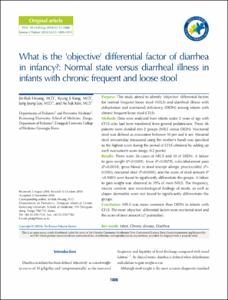What is the 'objective' differential factor of diarrhea in infancy?: Normal state versus diarrheal illness in infants with chronic frequent and loose stool
- Keimyung Author(s)
- Hwang, Jin Bok; Lee, Jung Jeung
- Journal Title
- Korean Journal of Pediatrics
- Issued Date
- 2010
- Volume
- 53
- Issue
- 12
- Keyword
- Infant; Chronic disease; Diarrhea
- Abstract
- Purpose: This study aimed to identify 'objective' differential factors for normal frequent loose stool (NFLS) and diarrheal illness with
dehydration and nutritional deficiency (DIDN) among infants with chronic frequent loose stool (CFLS). Methods: Data were analyzed from infants under 2 years of age with CFLS who had been transferred from general pediatricians. These 46 patients were divided into 2 groups (NFLS versus DIDN). Nocturnal stool was defined as evacuation between 10 pm and 6 am. Maximal stool amount/day (measured using the mother's hand) was specified as the highest score during the period of CFLS obtained by adding up each evacuation's score (range, 0-2 points). Results: There were 36 cases of NFLS and 10 of DIDN. A failure to gain weight (P=0.0001), fever (P=0.0079), colic/abdominal pain
(P=0.0014), gross blood in stool (except allergic proctocolitis) (P= 0.0113), nocturnal stool (P=0.0001), and the score of stool amount (P
=0.0001) were found to significantly differentiate the groups. A failure to gain weight was observed in 39% of even NFLS. The frequency,
mucus content, and microbiological findings of stools, as well as diaper dermatitis were not found to significantly differentiate the groups.
Conclusion: NFLS was more common than DIDN in infants with CFLS. The most 'objective' differential factors were nocturnal stool and the score of stool amount (≥7 points/day).
- Publisher
- School of Medicine
- Citation
- Jin-Bok Hwang et al. (2010). What is the “objective” differential factor of diarrhea in infancy?: Normal state versus diarrheal illness in infants with chronic frequent and loose stool. Korean Journal of Pediatrics, 53(12), 1006–1011. doi: 10.3345/kjp.2010.53.12.1006
- Type
- Article
- ISSN
- 1738-1061
- Appears in Collections:
- 1. School of Medicine (의과대학) > Dept. of Pediatrics (소아청소년학)
1. School of Medicine (의과대학) > Dept. of Preventive Medicine (예방의학)
- 파일 목록
-
-
Download
 oak-aaa-03520.pdf
기타 데이터 / 606.3 kB / Adobe PDF
oak-aaa-03520.pdf
기타 데이터 / 606.3 kB / Adobe PDF
-
Items in Repository are protected by copyright, with all rights reserved, unless otherwise indicated.